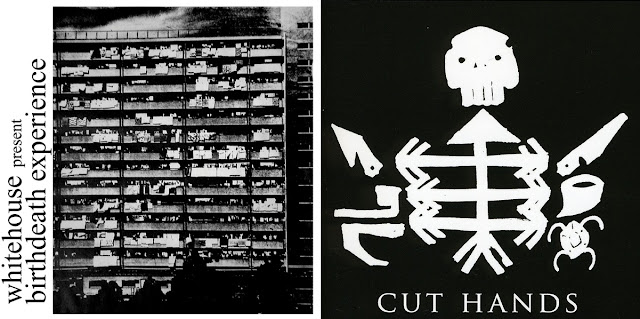All three CDs rarely got played over the years, but this week, following on from the Bennett interview, I’ve been reacquainting myself with these albums with a fresh perspective. The Erector and Peter Kurten albums remain uncompromising as ever, but I’ve been enjoying tremendously Birthdeath Experience these past few days. There seems to be a consensus that Whitehouse’s 1980 debut has dated badly over the years, an opinion that sounds suspiciously like the kind of macho-posturing one tends to find in the Noise scene. Instead, I would consider the album the most accessible of Whitehouse’s discography, Bennett had yet to further reduce the Whitehouse sound to its most basic and disturbing elements and Birthdeath Experience has more shade and color (and effects) than subsequent albums, and there are some surprisingly expressionist vocals too, Mindphaser in particular sounding genuinely unsettling. And I like the closing title track, 3 minutes of Cageian silence which I suspect played better in the pre-compact disc era, where the white noise of the preceding track Coitus give way to the gentle crackle and surface noise of vinyl.
The other William Bennett work that I’ve been listening to this week, not a Whitehouse album, but another starting point of sorts has been Afro Noise I, the debut album by Cut Hands, Bennett’s exploration of African rhythms and percussive instruments and sounds. I picked up this album a few years ago and was impressed by its power and velocity but after a few cursory listens, I filed the album away and all but forgot about it. Fortunately in the intervening years my interest in African music steadily developed thanks in no small part to labels like Analogue Africa and Soundway, which places the Afro Noise I album in a much more appreciable context. There’s an overlap between Whitehouse and Cut Hands – three of the tracks on Afro Noise I appeared on previously released Whitehouse albums (none of which I have) forging a link between Bennett’s projects, but Cut Hands on the whole is a far more accessible and richer listening experience, with its intricate polyrhythms on tracks like Stabbers Conspiracy and Shut Up And Bleed and there are dark and disquieting washes of sound on Rain Washes Over Chaff and Bia Mintatu, while ++++ (Four Crosses) almost strays into Ambient territory. And lest we forget that Cut Hands did evolve from Whitehouse, the high frequency tones on Nzambi Ia Lufua are genuinely painful on the ears. I’ve read that Bennett has accompanied Cut Hands shows with visuals that featured African symbols and calligraphic images and I could imagine some of the more extreme sequences from Africa Addio or Richard Stanley’s 2002 film The White Darkness, which explores Haitian Vodou working just as well…


No comments:
Post a Comment